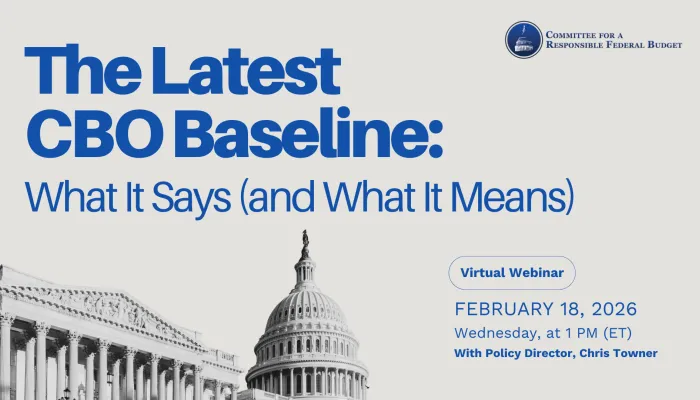CRFB Reacts to the President’s FY 2025 Budget
President Biden released his Fiscal Year 2025 budget request today, including a number of tax and spending proposals and a roadmap for the country’s finances over the next decade.
Under the President’s budget, based on its own estimates, the national debt would rise to $45.1 trillion or 105.6 percent of Gross Domestic Product (GDP) by 2034, from $27.4 trillion or about 97 percent of GDP today. The budget would reduce deficits by a net $3.3 trillion over the next decade, relative to its baseline.
A preliminary analysis of the budget is available here, and a full analysis will be sent out later today. The following is a statement from Maya MacGuineas, president of the Committee for a Responsible Federal Budget:
The national debt is on a steady march upwards, and it would take nearly $8 trillion of savings just to stabilize the debt over the next decade. It’s dangerous that we’ve let things get this bad, and we need to treat it like the priority that it is. The President’s call for over $3 trillion of deficit reduction is a welcome start, and he deserves credit for presenting a budget that pays for new initiatives and improves our fiscal situation; but the budget doesn’t go nearly far enough.
There are many helpful proposals in the budget that could reduce projected deficits, including ideas to close various tax loopholes, lower prescription drug costs, and raise significant amounts of new revenue. But at the same time, it turns around and spends much of this money, eating into the overall savings. And spending would grow more than it was already projected to, reaching record levels during a non-emergency period starting this year. Given our debt situation, we need to be slowing government spending, not growing it.
The White House needs to make debt reduction a major priority and work with Congress to take the issue seriously, stop making promises about what they won’t do, and work together to come up with serious workable solutions.
This year, interest payments on the national debt will surpass spending on defense – a milestone that threatens our standing as the leader of the free world – and surpass spending on Medicare as well. Under current law, we will borrow more than $20 trillion over the next decade – and that’s assuming we don’t extend any of the expiring policies over the next few years. Meanwhile, Social Security and Medicare trust funds will be insolvent within a decade. We’ve reached the point at which baby steps just aren’t going to cut it anymore.
The President’s budget proposes about $6 trillion of new revenue and spending reductions. But around half of that will go to fund new initiatives and most of what’s remaining might be needed to extend expiring tax cuts below $400,000 – something the President has called for without saying how he’d pay for it.
The President deserves kudos for paying for his new initiatives. Agreeing that new policies should not add one penny to the debt is a critical first start in addressing our debt situation. Given our dismal fiscal situation, though, we really shouldn’t be passing big new spending programs and tax cuts until we have a plan to fix the debt and responsibly address any policy extensions.
Not helpful is the President’s refusal to touch Social Security, the largest government program, or the roughly 95 percent of taxpayers making less than $400,000 per year. That’s like asking a doctor to perform a surgery with one hand tied behind his back.
Calling for new revenue to secure Medicare is important, but we also need a plan to hold down health care costs and to restore Social Security solvency before its trust fund runs out in less than a decade. Each year we spend ducking the hard choices is a year we could have spent saving these programs not just for future generations, but also for current retirees who may otherwise be harmed.
We are entering an inflection point in our nation’s fiscal history. Time is of the essence to get our situation under control. Both the economy and our national security depend on it.
This budget is an important step in the right direction, but it’s still too little. The budget lacks a plan to put the debt on a downward path, to pay for its proposed tax cut extensions, or to prevent the 23 percent across-the-board Social Security benefit cut – the equivalent of a $17,400 cut for a newly retired couple – scheduled to take effect around 2033.
We need presidential leadership to take the bull by the horns and get our fiscal health under control, and we need Congressional leadership as well. With divided government in an election year, we know it won’t be easy – it hardly ever is. Nevertheless, the President and Congress should work together, as they did last year with the Fiscal Responsibility Act, to begin making some serious progress.
###
For more information, please contact Matt Klucher, Assistant Director for Media Relations, at klucher@crfb.org.


